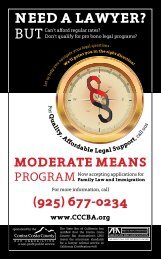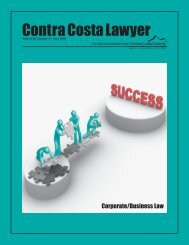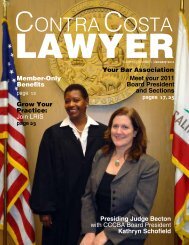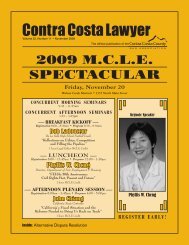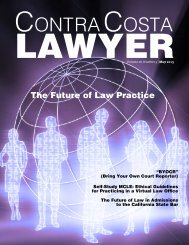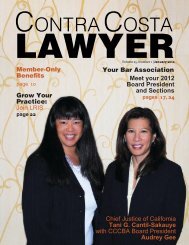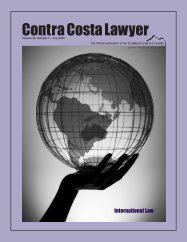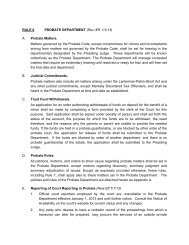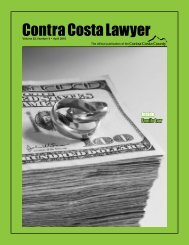download - Contra Costa County Bar Association
download - Contra Costa County Bar Association
download - Contra Costa County Bar Association
You also want an ePaper? Increase the reach of your titles
YUMPU automatically turns print PDFs into web optimized ePapers that Google loves.
Provisions,<br />
cont. from page 15<br />
existing LLCs and S corporations<br />
may want to explore conversion to<br />
C corporation status prior to the end<br />
of 2013. Will the exclusion be extended<br />
beyond 2013 or made applicable<br />
for California income tax purposes?<br />
There is certainly reason to<br />
hope so, given that the economy is<br />
likely to remain very sluggish well<br />
beyond 2013 or even return to recession<br />
as a result of the anti-growth<br />
policies currently being pursued in<br />
Sacramento and Washington.<br />
S Corporation: Built-in<br />
Gains Relief Provision<br />
C corporations can gain the benefit<br />
of a single level of taxation by converting<br />
to S corporations. However,<br />
converted S corporations remain<br />
subject to tax on built-in gains on<br />
assets that existed at the time of<br />
conversion. If the S corporation disposes<br />
of any BIG assets during the<br />
10-year period following conversion,<br />
the realized built-in gains are<br />
taxed at the highest C corporation<br />
tax rate, currently 35 percent. As a<br />
result of economic stimulus legislation<br />
in 2009 and 2010, the holding<br />
period for BIG assets was reduced.<br />
For tax years beginning in 2009 and<br />
2010, the holding period was seven<br />
years. For tax years beginning in<br />
2011, the holding period was five<br />
years, meaning that in 2011 an S<br />
corporation could sell BIG assets<br />
held as little as five years without<br />
being subject to BIG tax.<br />
Like the relief provision for QSBS<br />
discussed above, this S corporation<br />
relief provision expired at the end<br />
of 2011. However, ARTA 2012 extended<br />
the five-year holding period<br />
through the end of 2013 and made it<br />
retroactively applicable to 2012.<br />
What Wasn’t in ATRA<br />
2012 (but may be on<br />
the horizon):<br />
The U.S. corporate tax system has<br />
grown increasingly out of sync with<br />
the corporate tax structures in other<br />
developed countries. The U.S. currently<br />
taxes corporate income at a<br />
top rate of 35 percent - the highest<br />
among advanced world economies.<br />
The average is closer to 25 percent<br />
in most of the developed world.<br />
Moreover, most of the other developed<br />
countries have a territorial tax<br />
system, under which a company<br />
is taxed only on income generated<br />
domestically. The U.S., on the<br />
other hand, taxes a corporation on<br />
its worldwide income. Tax credits<br />
are available for taxes paid in a foreign<br />
jurisdiction, but if those taxes<br />
are imposed at a lower rate (which<br />
will usually be the case) the U.S.<br />
corporation effectively pays the<br />
higher U.S. tax rate. U.S. taxation of<br />
foreign earnings can be delayed by<br />
keeping the earnings inside foreign<br />
subsidiaries, but the earnings will<br />
be subject to U.S. taxation when<br />
repatriated to the U.S. According to<br />
J.P. Morgan, U.S. companies control<br />
$1.7 trillion in foreign earnings held<br />
outside the U.S., a portion of which<br />
would doubtless be repatriated and<br />
used for investment in the U.S. but<br />
for the disincentives in the current<br />
corporate tax system.<br />
There is an emerging consensus<br />
on both sides of the political aisle<br />
that the U.S. corporate tax system<br />
needs to be reformed to make it<br />
more competitive. President Obama<br />
has at least paid lip service to the<br />
notion in the presidential debates<br />
last fall. Proposals for legislative<br />
reforms are being actively debated,<br />
and the impetus for taking action is<br />
strong given the serious imbalance<br />
between the U.S. corporate tax system<br />
and that of our major trading<br />
partners.<br />
The outcome of reform proposals<br />
is far from certain, but what would<br />
be the implications of a reduction in<br />
top U.S. corporate tax rates to something<br />
in the 25 percent ballpark? A<br />
top corporate rate significantly below<br />
the individual rate, currently<br />
39.6 percent, will reduce the tax<br />
incentive for forming pass-through<br />
entities (LLCs and S corporations).<br />
There was a time in the past when<br />
a similar dynamic prevailed. For example,<br />
in the 1960s and 70s the top<br />
individual rate was 70 percent, but<br />
the top corporate rate was 35 percent.<br />
In those times it was not uncommon<br />
for closely held businesses<br />
to operate as C corporations. It was<br />
even common to hold real estate in<br />
C corporations – something that is<br />
considered the height of lunacy today.<br />
Nonetheless, if we again see a<br />
significant rate differential, it may<br />
be “back to the future.”<br />
Even without legislative reform,<br />
the temporary extension of the<br />
100 percent exclusion for QSBS discussed<br />
above gives the C corporation<br />
a comparative advantage in<br />
some situations through the end<br />
of 2013, and maybe later if it is extended.<br />
s<br />
1<br />
P.L. 112-240, signed by the President on<br />
January 3, 2013.<br />
2<br />
The definition of “qualified trade or business”<br />
excludes investment companies,<br />
professional services and consulting,<br />
banking, insurance and other financial<br />
services, farming, oil & gas or mineral extraction,<br />
and the hotel, motel or restaurant<br />
business.<br />
George S. Cabot is a Partner at<br />
PremierCounsel LLP, with offices<br />
in San Francisco and Lafayette.<br />
George is a Certified Tax Specialist<br />
with a business transactional practice<br />
focusing on structuring business<br />
entities, M&A and entity level<br />
tax planning.<br />
Win A $100 GIFT CARD!<br />
We will be sending out a<br />
member survey via email this<br />
month and would greatly appreciate<br />
your feedback. When<br />
you receive it, please complete<br />
the survey for a chance to win<br />
a $100 gift card to the store<br />
or restaurant of your choice!<br />
16<br />
MARCH 2013



